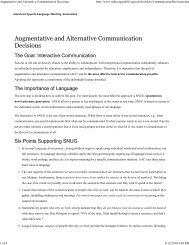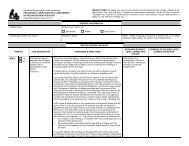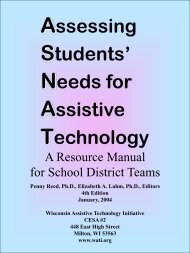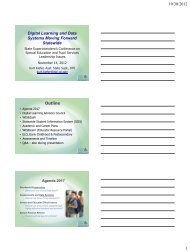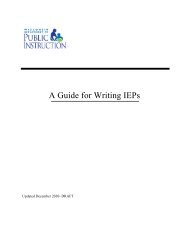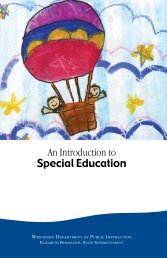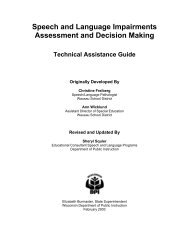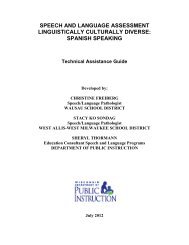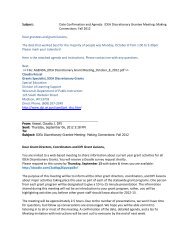Extended School Year Services (ESY) - The Special Education Team
Extended School Year Services (ESY) - The Special Education Team
Extended School Year Services (ESY) - The Special Education Team
You also want an ePaper? Increase the reach of your titles
YUMPU automatically turns print PDFs into web optimized ePapers that Google loves.
David - page 2<br />
7/1999<br />
Revised 8/2004<br />
increased. In the spring, his teachers were considering a regular classroom setting for<br />
all of Language Arts/Reading and possibly even math for the upcoming school year.<br />
IEP <strong>Team</strong><br />
<strong>The</strong> IEP team met in May of that year and reviewed David's goals/objectives, addressing<br />
the following areas:<br />
• Initiating appropriate interactions with peers and adults.<br />
• Maintaining conversational exchanges with adults.<br />
• Bringing appropriate materials to class.<br />
• Improving basic academic skills/knowledge in all content areas, with emphasis<br />
on the underlying abstract concepts and/or reasons.<br />
• Increasing the frequency and duration of nondistracting behaviors.<br />
Examination of Progress on IEP Goals/Objectives<br />
It was evident to the IEP team that David had made academic, social, and behavioral<br />
progress during that school year. <strong>The</strong> team discussed relevant information supporting<br />
the progress he had made.<br />
Factors to Consider:<br />
Consideration of Regression/Recoupment<br />
It was evident to the IEP team that the above-noted progress had continued over the<br />
previous summer, the winter holiday period, a weeklong bout with the flu, and<br />
spring break. No IEP committee member, including his parents, could provide<br />
evidence of significant regression in academic, social, and/or behavioral areas as a<br />
result of breaks in school instruction.<br />
Consideration of Emerging/Critical Skills and of the Severity of the Disability<br />
All members of the IEP team agreed that David was a high functioning student with<br />
stereotypical behaviors and characteristics frequently found in individuals with<br />
Autism, but overall, the severity level of David's disability was mild. David's steady<br />
progress, academic skill levels, basic social skills, and solid communication abilities<br />
did not suggest that David's overall development in any particular area was at a<br />
significant point related to the emergence of a critical life skill. To the contrary,<br />
David's progress over the years was steady with few, if any, set backs and/or times of<br />
difficulty in skill acquisition.<br />
Consideration of Interfering Behaviors<br />
David's decrease in hand flapping/rocking/vocalizing behaviors had been dramatic<br />
from February through May. At the time of the IEP team meeting, David's episodes<br />
of flapping behavior were under the control of his teacher, who guided David's<br />
classroom educational experiences and allowed periodic/time-limited opportunities<br />
for flapping. <strong>The</strong> team discussed the important relationship between the decrease in<br />
David's flapping/disrupting behaviors and the resulting consideration of an increase<br />
in the amount of time in a regular educational environment.<br />
CESA #9: 1999 Determining <strong>ESY</strong> <strong>Services</strong>, Revised 2004 26



